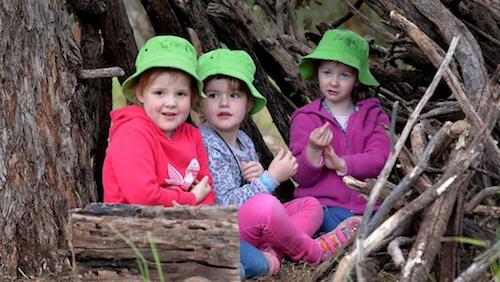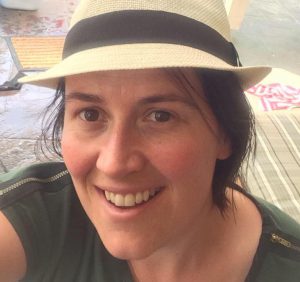Martel Menz, Vice President Early Childhood, Australian Education Union, returns as a guest writer this week with a thoughtful post on leadership. Leading, she says, can occur at every level of an organisation, regardless of your job title. Leadership is a commitment to each other. CELA also spoke with Stephanie Willey from Yarralea Children’s Centre, about the way respect and trust create opportunities for every staff member to lead at their Alphington service.
When a gazelle senses trouble, it alerts the rest of its herd, increasing the chances of survival of all. Unfortunately, many of us work in environments where members of the group don’t care much about one another’s fate. Which means that valuable information, like impending danger, is often kept secret. As a result, bonds of trust among employees or between leaders and workers are weak, if they exist at all… This means that when there is only a weak Circle of Safety and people must invest time and energy to guard against politics and other dangers inside the company, it actually makes us even more selfish and less concerned about one another and the organisation... This is what work-life balance means. It has nothing to do with the hours we work or the stress we suffer. It has to do with where we feel safe. If we feel safe at home, but we don’t feel safe at work, then we will suffer what we perceive to be a work-life imbalance. If we have strong relationships at home and at work, if we feel like we belong, if we feel protected in both, then the powerful forces of a magical chemical like oxytocin can diminish the effect of stress and cortisol. With trust, we do things for each other, look out for each other and sacrifice for each other. All of which adds up to our sense of security inside a Circle of Safety. We have a feeling of comfort and confidence at work that reduces the overall stress we feel because we do not feel our well-being is threatened.
- Simon Sinek, 2014, Leaders Eat Last
 Leadership is a commitment to each other
Leadership is a commitment to each other
You can feel it in the air
I’ve been thinking a lot lately about the wellbeing of the early childhood profession, and the conditions of work that either facilitate a healthy workplace or cause stress, overwhelm, and despair for staff. In all of my conversations, workplace visits, and engaging on social media, there is a clear and common thread: how people treat each other determines everything else.
As soon as I step into an early childhood setting, a meeting room or any gathering of people, the mood is palpable. You can feel whether there is a sense of joy and pleasure in people’s work, or whether people feel beaten and downtrodden. And when I delve a little deeper to discover what contributes to the positive or negative energy, it always comes back to the people. The group of staff and how they work together, the relationships with the leadership and management team, the connection or disconnection between employer and employees.
Value our adult relationships
In a profession that places such high priority on relationships with children, I’m sometimes a little surprised by the undervaluing of the adult relationships. Relationships that are absolutely fundamental to the success of what you do with children and families.
Where relationships are valued and underpinned by trust and respect, the mood is markedly different. People enjoy being in each other’s company. People’s responses to challenge and change are also different. Adversity can be faced with greater resilience and people support each other through difficult times. People check in with each other to see what they need to do their very best work. Compassion, kindness and trust take centre stage, rather than emotive reactions of blame, anger and fear. People work collectively and collaboratively rather than competitively.
I think we would all like to work in such environments. That’s not to say we bury our heads in the sand and pretend that everything is okay when it’s not, or get along with people in a superficial sense. But it’s prioritising people and our interactions over everything else.
The power of quiet, everyday acts
So what do we do when this isn’t the workplace culture and we are faced with some serious challenges?
I believe the key is leadership, and leadership in the broadest sense of the word. It has less to do with positional leadership (although people with formal leaderships roles have an important role to play), but more about how each of us can be leaders in a workplace and display leadership qualities to cultivate a strong, healthy team.
These acts don’t have to be big, grand statements. Often the quieter, everyday acts of leadership are more powerful.
Do we display acts of kindness? Do we offer our support and encouragement? Do we share a laugh? Do we lead by example? Do we all chip in when a task needs to get done? Do we go in to bat for each other? Do we acknowledge the work of others?
Put simply by Simon Sinek, “Leadership is always a commitment to human beings“.
A culture of respect promotes leadership at Yarralea Children’s Centre
 Yarralea Children’s Centre
Yarralea Children’s Centre
Stephanie Willey is the Coordinator at Yarralea Children’s Centre, a 44 place service for around 100 families and a staff of 15 – 14 educators and one office manager. Stephanie works part time, 28 hours over three days a week, and is the main contact for the centre’s volunteer management committee.
Stephanie says: “One thing you notice about our service is that usually when people come to work here they don’t leave.
 Stephanie Willey, Coordinator Yarralea Children’s Centre
Stephanie Willey, Coordinator Yarralea Children’s Centre
“A lot of our team have been working together for 10 years now. I put that down to a really strong base of respect and trust.
“For instance, I’ve got a really capable teaching team who are happy because they can focus just on their teaching, but they can also step in to my role if they need to, and in return I can back them up in teaching too.
“It’s part of the way we work here, to tap into the strengths and interests of our team, and people know that when they have an idea they can bring it up and they will be heard and supported.
“Just recently one of our co-educators had been talking with a boy in her room about ‘worm wee’ and came up with an initiative around packaging that up for families. Another time a co-educator had been reading about street libraries and she was able to take that on as her project for the centre.
“Staff lead a lot of the special programs here because of their interests: I have two staff working on a plan for Nutrition Week in October, another who is very focused on Indigenous education, others who organised an author and illustrator to visit in Book Week…
“Respect happens when you understand the importance of the roles other people play. Two of the teachers here had acted in my role before I was appointed. They don’t want to be in the coordinator’s job, but they know what it takes, and I know what their job takes, and that makes it easier to help each other out.”
So what does it take to create a culture of respect and trust?
Stephanie says there are lots of reasons for the Yarralea culture, some simple, some intangible. She shared these as examples:
- we’re very strong philosophically, and we have the luxury of being able to choose very carefully when we recruit so we make sure new people are a good fit
- our staff all work across the rooms so there’s no ‘ownership’ of one space or of any particular resources
- in the past we always ate lunch together in a tea room – we’ve changed the facilities a bit now but I still to try to always eat my lunch with others from the team
- we are available to each other and there’s a lot of empathy between us
- I advocate for my team with our management committee, and they know it
- we all accept that everybody may be different but everybody also has something to contribute.
And finally, Stephanie says, respect is something that builds up over time and a lot of it comes from being available to people and willing to hear their ideas, support them whenever it’s possible and negotiate when it’s not.